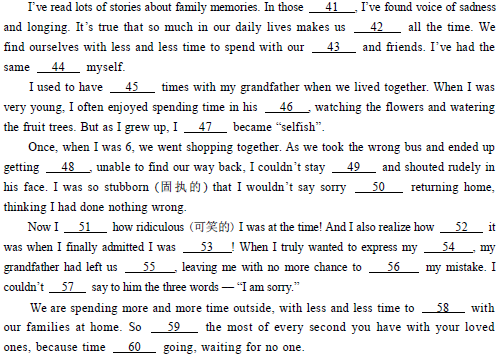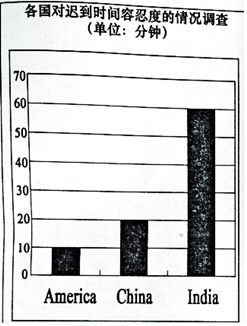题目内容
20.When a leafy plant is under attack,it doesn't sit quietly.Back in 1983,two scientists,Jack Schultz and lan Baldwin,reported that young maple trees getting bitten by insects send out a particular smell that neighboring plants can get.These chemicals come from the injured parts of the plant and seem to be an alarm.What the plants pump through the air is a mixture of chemicals known as volatile organic compounds,VOCs for short.Scientists have found that all kinds of plants give out VOCs when being attacked.It's a plant's way of crying out.But is anyone listening?Apparently.Because we can watch the neighbours react.
Some plants pump out smelly chemicals to keep insects away.But others do double duty.They pump out perfumes designed to attract different insects who are natural enemies to the attackers.Once they arrive,the tables are turned .The attacker who was lunching now becomes lunch.
In study after study,it appears that these chemical conversations help the neighbors.The damage is usually more serious on the first plant,but the neighbors,relatively speaking,stay safer because they heard the alarm and knew what to do.
Does this mean that plants talk to each other?Scientists don't know.Maybe the first plant just made a cry of pain or was sending a message to its own branches,and so,in effect,was talking to itself.Perhaps the neighbors just happened to"overhear"the cry.So information was exchanged,but it wasn't a true,intentional back and forth.
Charles Darwin,over 150years ago,imagined a world far busier,noisier and more intimate(亲密的) than the world we can see and hear.Our senses are weak.There's a whole lot going on.
32.What does a plant do when it is under attack?D
A.It makes noises.
B.It gets help from other plants.
C.It stands quietly.
D.It sends out certain chemicals.
33.What does the author mean by"the tables are turned"in paragraph 3?A
A.The attackers get attacked.
B.The insects gather under the table.
C.The plants get ready to fight back.
D.The perfumes attract natural enemies.
34.Scientists find from their studies that plants canB.
A.predict natural disasters
B.protect themselves against insects
C.talk to one another intentionally
D.help their neighbors when necessary
35.What can we infer from the last paragraph?C
A.The word is changing faster than ever.
B.People have stronger senses than before
C.The world is more complex than it seems
D.People in Darwin's time were more imaginative.
分析 本文是一篇说明文,讲述了植物是如何保护自己的.植物可以通过释放化学物质来发出警告,研究表明,一些植物不但可以保护自己免受昆虫的伤害,还能以昆虫为食.所以说世界比表面上看起来更复杂,仅仅凭借我们的感官不能了解全部的世界.
解答 32-35.DABC
32.D 考查细节理解.根据"These chemicals come from the injured parts of the plant and seem to be an alarm"可知,当植物受到攻击而受伤时,会释放出一种化学物质来发出警告.故选D.
33.A 考查推理判断.根据"The attacker who was lunching now becomes lunch"可知是想要包餐一顿的生物反过来被吃了,所以"the tables are turned"是指袭击者反过来被攻击.故选A.
34.B 考查细节理解.根据上一题的描述可知,植物不但可以保护自己免受昆虫的伤害,还能以昆虫为食.故选B.
35.C 考查推理判断.根据"Our senses are weak.There's a whole lot going on."可知,世界比表面上看起来更复杂,仅仅凭借我们的感官不能了解全部的世界.故选C.
点评 阅读理解考察学生的细节理解和推理判断能力,做细节理解题时一定要找到文章中的原句,和题干进行比较,再做出正确的选择.在做推理判断题不要以个人的主观想象代替文章的事实,要根据文章事实进行合乎逻辑的推理判断.

练习册系列答案
 天天向上一本好卷系列答案
天天向上一本好卷系列答案 小学生10分钟应用题系列答案
小学生10分钟应用题系列答案
相关题目
3. "
"
 "
"| 41.A.books | B.stories | C.reports | D.films |
| 42.A.crazy | B.easy | C.busy | D.angry |
| 43.A.families | B.classmates | C.colleagues | D.employers |
| 44.A.adventure | B.research | C.exploration | D.experience |
| 45.A.good | B.hard | C.sad | D.urgent |
| 46.A.kitchen | B.garage | C.house | D.garden |
| 47.A.frequently | B.rarely | C.gradually | D.finally |
| 48.A.bored | B.lost | C.hurt | D.upset |
| 49.A.calm | B.awake | C.firm | D.happy |
| 50.A.while | B.unless | C.until | D.after |
| 51.A.learn | B.imagine | C.realize | D.agree |
| 52.A.early | B.late | C.nice | D.guilty |
| 53.A.serious | B.nervous | C.wrong | D.painful |
| 54.A.concern | B.worry | C.opinion | D.regret |
| 55.A.forever | B.somehow | C.alone | D.instead |
| 56.A.care about | B.apologize for | C.think of | D.refer to |
| 57.A.again | B.often | C.even | D.still |
| 58.A.spare | B.save | C.take | D.kill |
| 59.A.follow | B.receive | C.divide | D.make |
| 60.A.needs | B.keeps | C.misses | D.stops |
7.Hello and welcome.My name is Shelley Ann Vernon and I am glad that you want to find out more about teaching English through games.Right here you will find ways to get great results in the classroom for children aged 4to 12; ways that are from my experience will bring more success and joy into the lives of the children you teach.
You'll learn how to make your serious classes fun,how to ensure everyone gets better grades,how to help inspire the brighter kids while nurturing the slower ones,and how to associate fun with learning by teaching vocabulary and grammar through language games.Earn even more appreciation,love and respect from your students and their parents for your teaching.
The games presented here work for ESL (English as a Second Language) pupils aged 4to 12.These games are most suitable for beginners to intermediate level (中级) students.
Don't take my word for it; read evidence from teachers and parents.
Click here to order now with our secure server.Remember,if you are not satisfied,just let us know and we will refund (退款) you in full.You still get to keep the essential bonus material,yours for FREE,and that's a rare time saving gain,plus a value of 25 dollars.
21.The passage is mainly written forA.
A.teachers
B.girls
C.students
D.doctors
22.Which of the following does the writer agree with?B
A.Teachers should make their classes serious.
B.A good class should associate fun with learning.
C.Only smart children can learn from the games.
D.Only pupils aged 2 can make good use of the games.
23.The writer wrote the passage toC.
A.tell teachers how to teach
B.recommend games to kids
C.persuade readers to buy a book
D.show her students'good performance
24.This passage is most probably taken from aC.
A.magazine
B.novel
C.website
D.newspaper.
You'll learn how to make your serious classes fun,how to ensure everyone gets better grades,how to help inspire the brighter kids while nurturing the slower ones,and how to associate fun with learning by teaching vocabulary and grammar through language games.Earn even more appreciation,love and respect from your students and their parents for your teaching.
The games presented here work for ESL (English as a Second Language) pupils aged 4to 12.These games are most suitable for beginners to intermediate level (中级) students.
Don't take my word for it; read evidence from teachers and parents.
| I found it valuable right away! Although I only bought your book on Monday,and today is Wednesday,I want you to know how valuable I have found it to be.I have used a couple of the games in school already and the children loved them. Most importantly,they were learning and reviewing English at the same time.Can I admit that I also enjoyed my lessons more? Gila Goldberg,Jerusalem |
| The games help with learning difficulties! My daughter Aurore has learning difficulties and since coming to your classes she has gained confidence and has improved in all subjects at school. Mrs.J.Brown,Canterbury,Kent,UK |
21.The passage is mainly written forA.
A.teachers
B.girls
C.students
D.doctors
22.Which of the following does the writer agree with?B
A.Teachers should make their classes serious.
B.A good class should associate fun with learning.
C.Only smart children can learn from the games.
D.Only pupils aged 2 can make good use of the games.
23.The writer wrote the passage toC.
A.tell teachers how to teach
B.recommend games to kids
C.persuade readers to buy a book
D.show her students'good performance
24.This passage is most probably taken from aC.
A.magazine
B.novel
C.website
D.newspaper.
 There are few habits as annoying as someone making us wait.However,some punctually-challenged people have no intention of offending anyone.They still want to keep friends,family and bosses happy.They are often painfully aware and ashamed of the damage their lateness could do to their relationships,reputations,careers and finances.
There are few habits as annoying as someone making us wait.However,some punctually-challenged people have no intention of offending anyone.They still want to keep friends,family and bosses happy.They are often painfully aware and ashamed of the damage their lateness could do to their relationships,reputations,careers and finances.